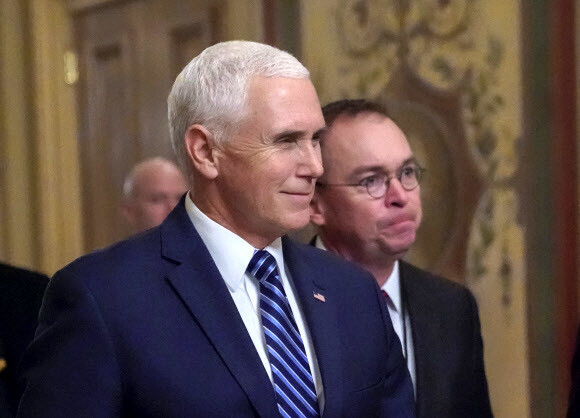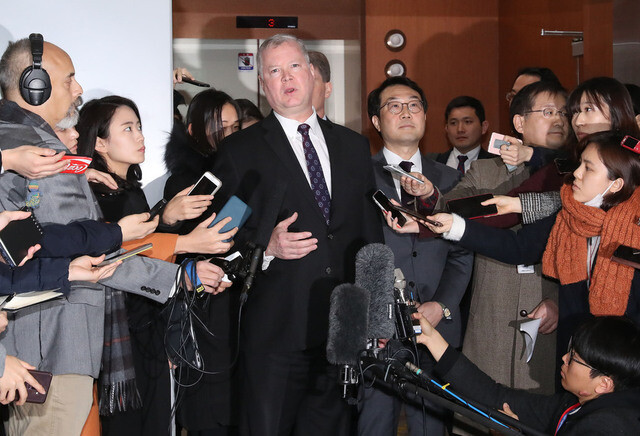hankyoreh
Links to other country sites 다른 나라 사이트 링크
[Editorial] North Korea should respond to US’ conciliatory gestures

The US has been sending a number of conciliatory signals toward North Korea since State Department Special Representative for North Korea Stephen Biegun’s recent visit to Seoul. On Dec. 22, it was reported that Vice President Mike Pence canceled a speech he was preparing to deliver last week with content critical of human rights suppressions in North Korea. Pence claimed the reason was a schedule conflict, but his decision is being seen as meant to avoid provoking Pyongyang. What is apparent is that Washington has been acting in a conciliatory fashion in order to break through the current deadlock and get dialogue started again with the North.
These kinds of signals from the US about restoring trust were also in evidence multiple times during Biegun’s visit. Shortly after he arrived in South Korea, Biegun announced that a private US group would be allowed to visit the North for humanitarian aid purposes. Secretary of State Mike Pompeo declared that North Korean leader Kim Jong-un was honoring his denuclearization promise and voiced hopes that Trump and Kim could meet early next year.
At a South Korea-US working group meeting on Dec. 21, a potential pathway was opened toward waiving sanctions on inter-Korean cooperation projects, including a planned groundbreaking ceremony for a railway and road linkage effort. These signs of good faith in terms of humanitarian aid and inter-Korean cooperation are clearly meant to keep the momentum of dialogue going.
Biegun also made some other noteworthy remarks, suggesting the US was prepared to examine various ways of building trust with the North and may consider discussing some of the specifics of a second North Korea-US summit in following-up dialogue. This reads as both a proposal to meet with his North Korean counterpart for high-level talks and working-level discussions toward a summit; it’s also a signal that trust-building measures will be brought up at the table once dialogue resumes. It’s a possible indication that Washington is willing to take proactive steps – including a declaration ending the Korean War – if a second summit takes place.
Friendly as the message from the US is, it is also a far cry from what the North is hoping for, which is the loosening of economic sanctions. But if we take into account the difficulties the Donald Trump administration faces in agreeing readily to Pyongyang’s demands given the anti-North Korea views held by the American mainstream, these kinds of conciliatory gestures could be seen as signaling efforts to break through the current dialogue impasse.
In that sense, the current moment calls for an answer from the North. North Korea’s leaders may feel that the US is skirting the fundamental issue with its face-saving measures on inter-Korean cooperation and humanitarian aid. But by adhering too strongly to its principles, it could end up making the mistake of wasting precious time.

For now, the focus of attention is on what kind of message emerges at the groundbreaking ceremony on Dec. 26. Senior South and North Korean leaders are scheduled to be present there. If North Korea comes out with a positive response to the US’ demands, it could spell good news for a resumption of bilateral dialogue. An even bigger focus of attention is what Kim Jong-un will say in his New Year’s address on Jan. 1.
Now that the US has made its own gestures of good will, we hope Kim will also make a generous decision for the sake of progress in bilateral relations and denuclearization tasks. A productive second North Korea-US summit in the near future is also the only way of adding further momentum to progress in inter-Korean relations.
Please direct comments or questions to [english@hani.co.kr]

Editorial・opinion
![[Column] Season 2 of special prosecutor probe may be coming to Korea soon [Column] Season 2 of special prosecutor probe may be coming to Korea soon](https://flexible.img.hani.co.kr/flexible/normal/500/300/imgdb/original/2024/0426/3317141030699447.jpg) [Column] Season 2 of special prosecutor probe may be coming to Korea soon
[Column] Season 2 of special prosecutor probe may be coming to Korea soon![[Column] Park Geun-hye déjà vu in Yoon Suk-yeol [Column] Park Geun-hye déjà vu in Yoon Suk-yeol](https://flexible.img.hani.co.kr/flexible/normal/500/300/imgdb/original/2024/0424/651713945113788.jpg) [Column] Park Geun-hye déjà vu in Yoon Suk-yeol
[Column] Park Geun-hye déjà vu in Yoon Suk-yeol- [Editorial] New weight of N. Korea’s nuclear threats makes dialogue all the more urgent
- [Guest essay] The real reason Korea’s new right wants to dub Rhee a founding father
- [Column] ‘Choson’: Is it time we start referring to N. Korea in its own terms?
- [Editorial] Japan’s rewriting of history with Korea has gone too far
- [Column] The president’s questionable capacity for dialogue
- [Column] Are chaebol firms just pizza pies for families to divvy up as they please?
- [Column] Has Korea, too, crossed the Rubicon on China?
- [Correspondent’s column] In Japan’s alliance with US, echoes of its past alliances with UK
Most viewed articles
- 1‘We must say no’: Seoul defense chief on Korean, USFK involvement in hypothetical Taiwan crisis
- 2N. Korean delegation’s trip to Iran shows how Pyongyang is leveraging ties with Moscow
- 3‘Weddingflation’ breaks the bank for Korean couples-to-be
- 4Korea sees more deaths than births for 52nd consecutive month in February
- 5[Editorial] New weight of N. Korea’s nuclear threats makes dialogue all the more urgent
- 6[Column] Has Korea, too, crossed the Rubicon on China?
- 7[Column] Park Geun-hye déjà vu in Yoon Suk-yeol
- 8[Guest essay] The real reason Korea’s new right wants to dub Rhee a founding father
- 9Amnesty notes ‘erosion’ of freedom of expression in Korea in annual human rights report
- 10[Reportage] On US campuses, student risk arrest as they call for divestment from Israel